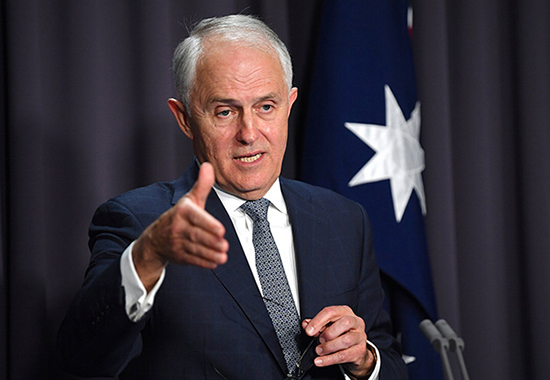


Australian Prime Minister Malcolm Turnbull. (Photo: VCG)
Never has Australia been so anxious as today in its foreign policy, especially when its Prime Minister Malcolm Turnbull asserted he will "stand up" in response to "China's criticism."
New foreign interference laws were introduced to the Australian parliament earlier this month and many believed the bills were targeted at China.
Senator Sam Dastyari's resignation over his links to Chinese donors to Labor Party coffers is considered a symbolic moment in the breakdown of this complacent and inward-looking approach toward China.
Australian media has never provided any solid evidence despite accusing Dastyari of being bought by a Chinese millionaire connected to the Communist Party of China. Many observers were surprised by the fierce reaction on the Australian side. It seemed like China was shot lying down.
The Chinese Embassy in Canberra says some Australian media have fabricated news stories while some politicians and bureaucrats have made irresponsible remarks. China's foreign ministry accused Turnbull of "poisoning" the bilateral relationship.
Australia has witnessed steady development of trade with China, ranging from iron ore and coal, through beef and fruit, dairy products and vitamins to tourism and education. The Australian business community is deeply concerned that the relationship with Beijing has reached a tipping point and has urged the government to ensure political tensions not damage bilateral trade, Chinese students or tourist numbers.
Australian relations are finely balanced, while former Australian ambassador to China Geoff Raby has warned that a sustained period of turbulence could reduce international demand for higher education in Australia, according to John Brumby, chairman of the Australia China Business Council.
Phil Honeywood, chief executive of the International Education Association of Australia, warned that there have been times when China responded to tension by targeting higher education markets.
"This occurred with Chinese students going to New Zealand about a decade ago because of concerns about the quality of education provided in New Zealand. That was quite a massive downturn for the New Zealand international education industry," Honeywood said.
Australia and China have come a long way together since the establishment of diplomatic relations. As Rowan Callick, a correspondent in Beijing, wrote for The Australian newspaper, China has become the biggest buyer of many of Australia's most important products while at the same time Australia is the largest supplier of crucial drivers of China's economy including iron ore and liquefied natural gas. Trade has multiplied 1,372 times in the past 45 years.
With so much Australian trade already tied to China, the future will be shaped by the strength of the bilateral relationship. Conversely, the biggest threat to Australia's exports to Asia would be a deterioration of the political relationship with China.
Australian business leaders are always reluctant to become involved in political debate, particularly when that debate involves China. But the stalemate will be a stark reminder to business leaders that politics may now be in danger of damaging what until now has been a thriving business and trade relationship.
 Fire brigade in Shanghai holds group wedding
Fire brigade in Shanghai holds group wedding Tourists enjoy ice sculptures in Datan Town, north China
Tourists enjoy ice sculptures in Datan Town, north China Sunset scenery of Dayan Pagoda in Xi'an
Sunset scenery of Dayan Pagoda in Xi'an Tourists have fun at scenic spot in Nanlong Town, NW China
Tourists have fun at scenic spot in Nanlong Town, NW China Harbin attracts tourists by making best use of ice in winter
Harbin attracts tourists by making best use of ice in winter In pics: FIS Alpine Ski Women's World Cup Slalom
In pics: FIS Alpine Ski Women's World Cup Slalom Black-necked cranes rest at reservoir in Lhunzhub County, Lhasa
Black-necked cranes rest at reservoir in Lhunzhub County, Lhasa China's FAST telescope will be available to foreign scientists in April
China's FAST telescope will be available to foreign scientists in April "She power" plays indispensable role in poverty alleviation
"She power" plays indispensable role in poverty alleviation Top 10 world news events of People's Daily in 2020
Top 10 world news events of People's Daily in 2020 Top 10 China news events of People's Daily in 2020
Top 10 China news events of People's Daily in 2020 Top 10 media buzzwords of 2020
Top 10 media buzzwords of 2020 Year-ender:10 major tourism stories of 2020
Year-ender:10 major tourism stories of 2020 No interference in Venezuelan issues
No interference in Venezuelan issues
 Biz prepares for trade spat
Biz prepares for trade spat
 Broadcasting Continent
Broadcasting Continent Australia wins Chinese CEOs as US loses
Australia wins Chinese CEOs as US loses